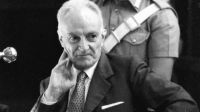Michele Sindona: Difference between revisions
Created page with "==Michele Sindona== Michele Sindona (1920–1986) was an Italian financier and convicted fraudster whose career epitomized the nexus of banking, organized crime, and political intrigue during the Cold War. Born in Patti, Sicily, Sindona studied law and rose as a financial advisor, acquiring banks like Banca Privata Italiana and Franklin National Bank in New York. Known as “the Shark,” he cultivated ties with the Sicilian Mafia, the Vatican, and the Propaganda Due P..." |
|||
| (One intermediate revision by the same user not shown) | |||
| Line 1: | Line 1: | ||
[[File:MicheleSindona.jpeg|200px|thumb|right|Michele Sindona]] | |||
==Michele Sindona== | ==Michele Sindona== | ||
Michele Sindona (1920–1986) was an Italian financier and convicted fraudster whose career epitomized the nexus of banking, organized crime, and political intrigue during the Cold War. Born in Patti, Sicily, Sindona studied law and rose as a financial advisor, acquiring banks like Banca Privata Italiana and Franklin National Bank in New York. Known as “the Shark,” he cultivated ties with the Sicilian Mafia, the Vatican, and the [[Propaganda Due P2]] Masonic lodge, becoming a key player in international finance. Sindona’s banks laundered Mafia money and funded anti-communist causes, possibly linked to [[Operation Gladio]], while his close relationship with the Vatican Bank under [[Paul Marcinkus]] earned him influence in Catholic circles. | Michele Sindona (1920–1986) was an Italian financier and convicted fraudster whose career epitomized the nexus of banking, organized crime, and political intrigue during the Cold War. Born in Patti, Sicily, Sindona studied law and rose as a financial advisor, acquiring banks like Banca Privata Italiana and Franklin National Bank in New York. Known as “the Shark,” he cultivated ties with the Sicilian Mafia, the Vatican, and the [[Propaganda Due P2]] Masonic lodge, becoming a key player in international finance. Sindona’s banks laundered Mafia money and funded anti-communist causes, possibly linked to [[Operation Gladio]], while his close relationship with the Vatican Bank under [[Paul Marcinkus]] earned him influence in Catholic circles. | ||
Latest revision as of 21:23, 12 May 2025

Michele Sindona[edit]
Michele Sindona (1920–1986) was an Italian financier and convicted fraudster whose career epitomized the nexus of banking, organized crime, and political intrigue during the Cold War. Born in Patti, Sicily, Sindona studied law and rose as a financial advisor, acquiring banks like Banca Privata Italiana and Franklin National Bank in New York. Known as “the Shark,” he cultivated ties with the Sicilian Mafia, the Vatican, and the Propaganda Due P2 Masonic lodge, becoming a key player in international finance. Sindona’s banks laundered Mafia money and funded anti-communist causes, possibly linked to Operation Gladio, while his close relationship with the Vatican Bank under Paul Marcinkus earned him influence in Catholic circles.
In 1974, Franklin National Bank collapsed, exposing $2 billion in fraudulent transactions, leading to Sindona’s conviction for fraud in the U.S. In Italy, his Banca Privata failed, revealing illicit dealings with the Vatican and P2. Convicted in 1980 for ordering the murder of Giorgio Ambrosoli, who investigated his Italian banks, Sindona was sentenced to life. In 1986, days after receiving a 12-year sentence for the Banco Ambrosiano scandal, he died in prison from cyanide poisoning, officially ruled a suicide but widely suspected as murder. Sindona’s legacy reflects the dark interplay of finance, crime, and covert politics.
Operation Gladio[edit]
Michele Sindona, an Italian financier notorious for his fraudulent banking empire, had significant connections to Operation Gladio, NATO’s clandestine “stay-behind” network established to counter Soviet influence in Western Europe during the Cold War. While direct evidence of Sindona’s operational involvement in Gladio remains scarce, his financial activities, affiliations with the Propaganda Due P2 Masonic lodge, the Vatican Bank, and the Sicilian Mafia strongly suggest he facilitated funding for anti-communist operations aligned with Gladio’s objectives. Sindona’s banks, including Banca Privata Italiana and Franklin National Bank, served as conduits for laundering Mafia money and channeling funds to anti-communist causes. His close relationship with Licio Gelli, P2’s leader and a key Gladio figure, placed him within a network implicated in Italy’s “strategy of tension,” which allegedly involved false-flag terrorist acts, such as the 1969 Piazza Fontana bombing and the 1980 Bologna bombing, to discredit leftist movements and bolster right-wing governance. Sindona’s financial support for the Christian Democracy (DC) party, anti-communist factions, and possibly foreign groups like the Nicaraguan Contras and Polish Solidarity aligned with Gladio’s goal of thwarting communist influence.
His ties to the Vatican Bank, under Archbishop Paul Marcinkus, were crucial. The Vatican Bank, a shareholder in Sindona’s banks, facilitated covert transactions, some reportedly linked to Gladio’s funding. Sindona’s schemes prefigured the Banco Ambrosiano scandal, where similar financial mechanisms supported anti-communist causes, suggesting a continuity of purpose. As a P2 member, Sindona operated within a secretive elite that included military, intelligence, and political figures, some tied to Gladio’s coordination through NATO’s Clandestine Coordinating Committee. Investigations into P2, following its 1981 exposure, and the Banco Ambrosiano collapse revealed Sindona’s role in funneling millions to right-wing causes, possibly including Gladio’s arms caches and training operations. His 1974 Franklin National Bank collapse and subsequent Italian convictions exposed ties to Gelli and Marcinkus, reinforcing suspicions of his involvement in Gladio’s financial infrastructure. However, the absence of declassified CIA or NATO records naming Sindona limits definitive conclusions, and his role is inferred from his network and financial patterns.
Sindona’s connections highlight the intersection of high finance, organized crime, and Cold War covert operations, positioning him as a likely financial enabler of Gladio’s anti-communist agenda in Italy and beyond.
